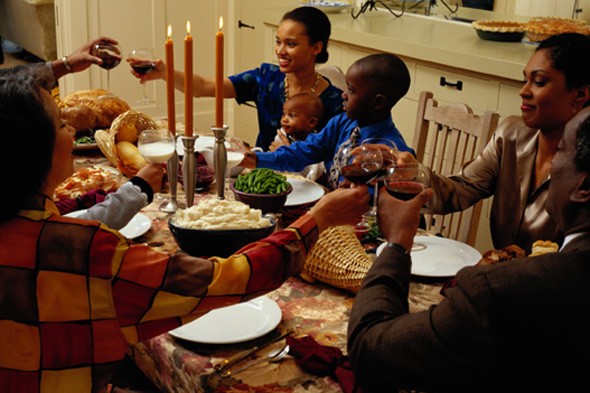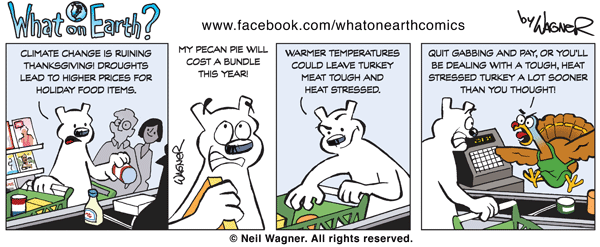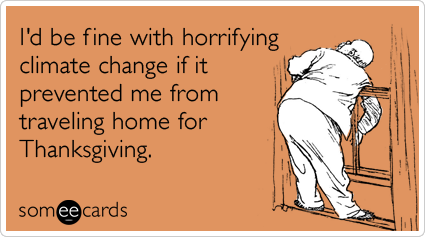
With the holidays coming up, many of us will soon be faced with family dinners. It’s a bit of a cliché that family dinners are places of political discord and uncomfortable silence. We all know not to discuss politics and religion at the dinner table (also try to avoid talking about sexuality, upcoming elections, your new vegan diet, etc.). But what about climate change? This conversation may go swimmingly among close friends, fellow activists, and passionate environmentalists, but outside of these like-minded circles how do you broach the subject? Because the bottom line is we NEED to talk about climate change, but how do we do it?
First off, let me just put it out there, that I do not talk about climate change well. I get passionate, defensive, worked up and typically when we have the climate change debate in my household, the conversations become more heated than the Midwest was this summer. But eventually, I started thinking that talking about how we talk about climate change may be a even better place to start than diving into the debate and nuances of climate change itself.
There are entire workshops, lectures, events, and classes that are taking place on how to talk about climate change! Because, while scientists have the power and the evidence to change how the general public thinks about the environment, and politicians have the ability to create policies and legislative change that can benefit the environment, we still have skeptics. Major, major skeptics.
In spite of what political rhetoric might have us believe, the majority of registered voters do want politicians to do something about climate change. Who knew?! According to the Yale Project on Climate Change Communication’s recent poll:
-A majority of all registered voters (55%) say that they will consider candidates’ views on global warming when deciding how to vote.
-Among these climate change issue voters, large majorities believe that global warming is happening and support action by the U.S. to reduce global warming, even if it has economic costs.
-Policies to reduce America’s dependence on fossil fuels and promote renewable energy are favored by a majority of registered voters across party lines.
(Thank you to this Grist article for proving my preconceived notions wrong).

So what does this mean about the public’s view on climate change? Well, it means that more people care than you think. Republican campaign linguist and researcher Frank Luntz’s recent report called “The Language of a Clean Energy Economy” has found that across the political spectrum, the majority of Americans do believe climate change is taking place (in some form) and that it is to a degree due to humans.
Okay, that’s a start.
So if it is indeed true that the majority of the population is at least partially convinced that climate change is real, why are we still arguing about it? As usual, it comes down to semantics, semantics, semantics. As Luntz stated in his report the debate is (mostly) not about whether or not climate change is taking place, but about how we address these issues. Instead of conjuring up Greenpeace-esque images of polar bears floating out into the Arctic on tiny ice caps or baby penguins trapped in oil spills, we need to put a human face to these issues and a local one at that.
By shifting the conversation away from what we are doing wrong, to what we can be doing right, conversations about climate change will transform from heated debates into cooler and more effective conversations. So what, exactly, does that look like?
First, we can highlight the sustainability movement’s growing impact and reach. For example, did you know that in 2010 alone there were 2.7 million “green industry” jobs in the US, quite a jump from 2003 when there were an estimated 2.1 million green industry jobs? Also, the solar energy sector employs more individuals (93,502 individuals in 2010, to be exact) than the steel industry and, unlike the steel industry, is poised to continue growing.
(Sources: The Brookings Institution – 2010; The National Solar Job Census – 2010)
We can also talk about simple ways that we can integrate change into our daily lives. By scaling down the issue of climate change and advocating for easy steps that we as individuals can make, we can all find ways to address this issue.
Some easy steps include:
-Make an effort to drive less. Walk, carpool, take your bike to work – no matter what, you’ll be saving on gas! And who doesn’t want to save money on gas?
-Stop wasting food and help grow it instead by contributing to local compost efforts. Save your scraps from going to the landfill where they create greenhouse gases and compost them instead. Greenmarket in NYC has a composting program and you can drop off your food scraps. The compost then goes to urban farms and gardens throughout the city! This is even something that you could do together when you want to walk off all that holiday eating.
(More on Greenmarket’s composting program here.)
For all amateur and professional environmentalists out there, lets work on cooling off this debate so we can engage in effective dialogue. Once we build this foundation, conversations about climate change can shift, doors will open, more people will be receptive to these conversations and we can begin to work on creating the larger, harder and much debated changes that need to take place.

By highlighting the positive changes we’ve made and what we have in common, we’re more likely to be heard by people who might not identify as “environmentalist.” Plus, you’ll be able to make it through a family dinner without it erupting. No guarantee that your family will appreciate your gluten-free vegan cooking, though.
Check out this infographic to see some of the damage that climate change and extreme weather have already inflicted on Thanksgiving dinner.
[The real benefit of this kind of conversation may be simply to make the issue of climate change less polarized and to spread the word, encouraging more people to simply think about the environment in their daily lives. This way, the necessary political solutions down the road, like a tax on carbon, become easier to achieve. — Editors]